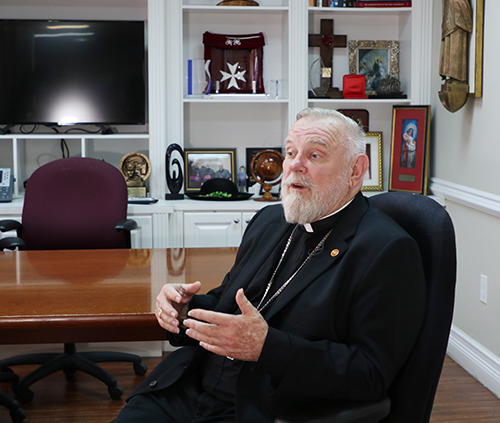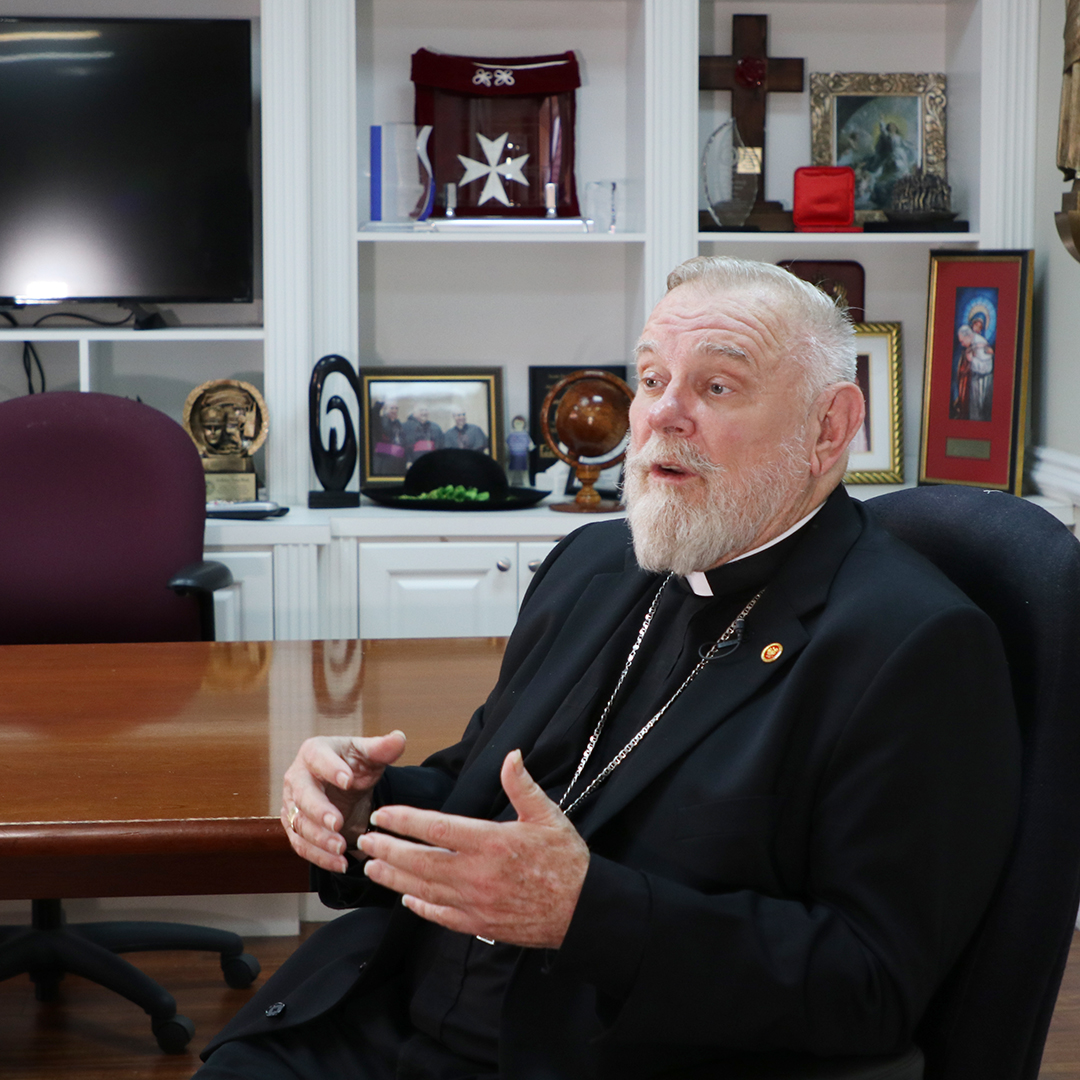By Rocio Granados - La Voz Catolica
MIAMI SHORES | For the first time, a Mass was celebrated at Alligator Alcatraz. A delegation from the Archdiocese of Miami, consisting of a priest and a deacon, celebrated Mass for the detainees at the detention center located in the Florida Everglades on Saturday, Aug. 2, 2025.
“I wasn’t there. One of my priests went and he reported that it went very well and the detainees were very grateful and receptive to being able to participate in the Mass,” said Miami Archbishop Thomas Wenski in an interview with some reporters at the Pastoral Center in Miami Shores, Aug. 5, 2025.
The Mass was celebrated in the cafeteria of the detention center and attended by about 150 people, most of whom were from Mexico, Guatemala and Honduras.
The archbishop pointed out that celebrating Mass for the detainees is “very important because these people had their lives disrupted. They were working one day and the next day they found themselves in Alligator Alcatraz, facing deportation. Going there and celebrating Mass is one way of affirming them and their humanity, of elevating their dignity and reminding them that they are not forgotten by God.”
It is also part of the Church's mission: "It is a work of charity to visit prisoners. As Christ said, 'What you do for the least of my brothers, you do for me.'"
Regarding the experience of the delegation that celebrated Mass, Archbishop Wenski said: “They were quite moved” and he added, “These people are people that we see in our pews every Sunday.”
The presence of the Church in prisons is “nothing new,” said the archbishop.
“We conduct religious services in prisons throughout the archdiocese.” He explained that he used to visit Krome Immigration Detention Center in the 1980s, when it opened, and when most of the detainees were Haitians.

Photographer: ROCIO GRANADOS | FC
Archbishop Thomas Wenski speaks about the first Mass celebrated at the Alligator Alcatraz Detention Center, Aug. 5, 2025, at the Pastoral Center in Miami Shores. A diocesan priest celebrated the Mass on August 2, and about 150 detainees attended.
Gaining access to Alligator Alcatraz to celebrate Mass took several weeks of coordination between the archdiocesan prison ministry and the state of Florida. Archbishop Wenski noted that part of the problem was determining who was really in charge. “Because when we made inquiries to the feds, they said, call the state and when we called the state of Florida, they said, no, call the feds.” Ultimately, the state of Florida granted permission to celebrate the Mass.
Archbishop Wenski's decision to show up there with a group of about 25 Knights of Columbus to pray the rosary outside the gates of the center July 20, 2025, may have contributed to the granting of permission to celebrate Masses.
The opening of the detention center on July 1, 2025, sparked controversy in the community due to its rapid construction, inadequate conditions for detainees, and location. "It is in a fairly isolated place," said the archbishop.
He added that the presence of the Church within the camp provides a certain level of protection for the detainees and emphasized the importance of the state offering protection standards to maintain the physical and mental health of the detainees.
This issue is also controversial because “Is it necessary that all these people be deported especially if they have not been criminals?” asked the archbishop.
"We must not focus only on deportation," he said. The administration should look for ways to provide a path to some type of legal status for people who have been here and have not committed any serious crimes. “President Trump can take a victory lap for getting the border under control and removing bad actors. At the same time, he wants to build the biggest economy ever. If he's going to do that, it'll be easier for him to do that by counting on the labor force participation of immigrants,” he indicated.
Archbishop Wenski explained that many people are in danger of deportation despite having entered the country legally as beneficiaries of President Joe Biden's humanitarian parole or as beneficiaries of Temporary Protected Status (TPS).
The archbishop said “We should figure out a way to extend their status here. That's going to be a lot less costly than trying to deport people en masse. It'll be a lot less dramatic, and it'll be a lot more beneficial, not only to the immigrants concerned, but to the broader American society.”
The archbishop concluded by saying, “We will continue our advocacy saying that enforcement only is not the best policy. The country would do better with more than just an enforcement policy. We have to look at a policy that recognizes the possibility of people staying here and that recognizes that their status in the future of this country is important.”
He mentioned that arrangements had been made to continue holding Mass on Sunday afternoons, and to perhaps hold a second Mass to meet the needs of the detainees and even staff members. The possibility of bringing in a musician and a singer to accompany the Mass was also discussed. The archbishop said, “the authorities said that they were open to do that, to provide this pastoral service to the detainees.”
“We're flexible, and we want to do whatever we can to minister to those detainees. We'll work with the authorities there, and hopefully they'll work with us to provide this service to the detainees,” said Archbishop Wenski.


Comments from readers